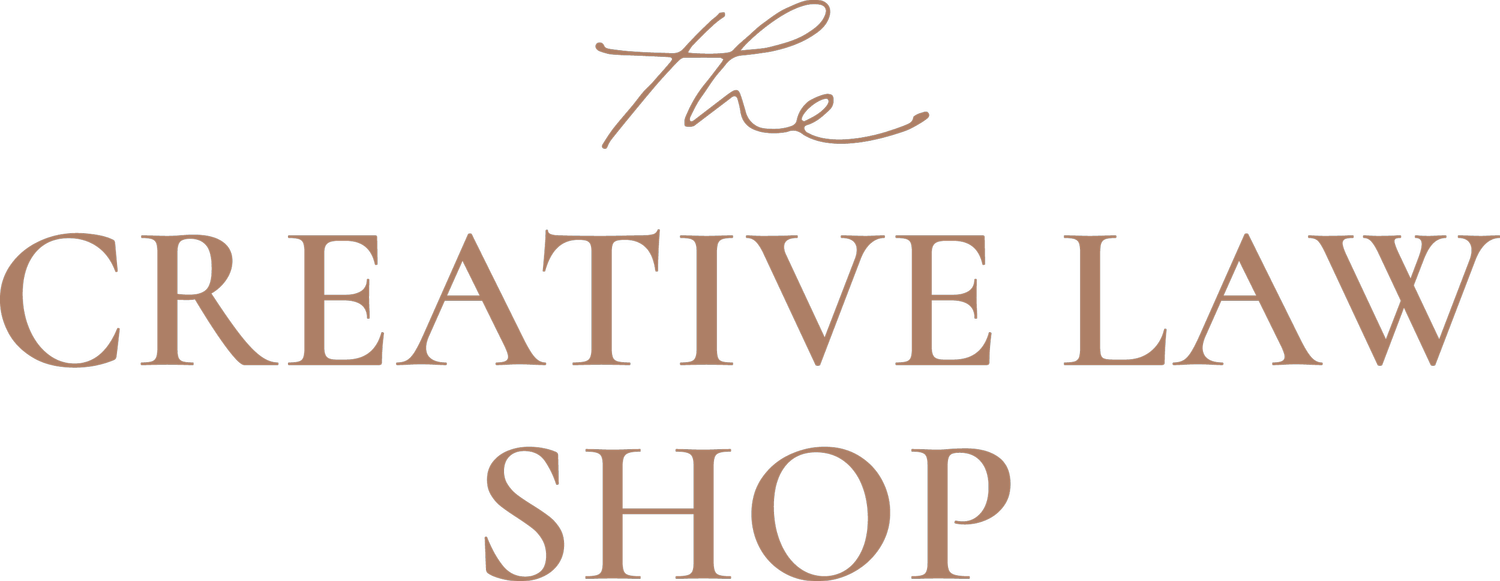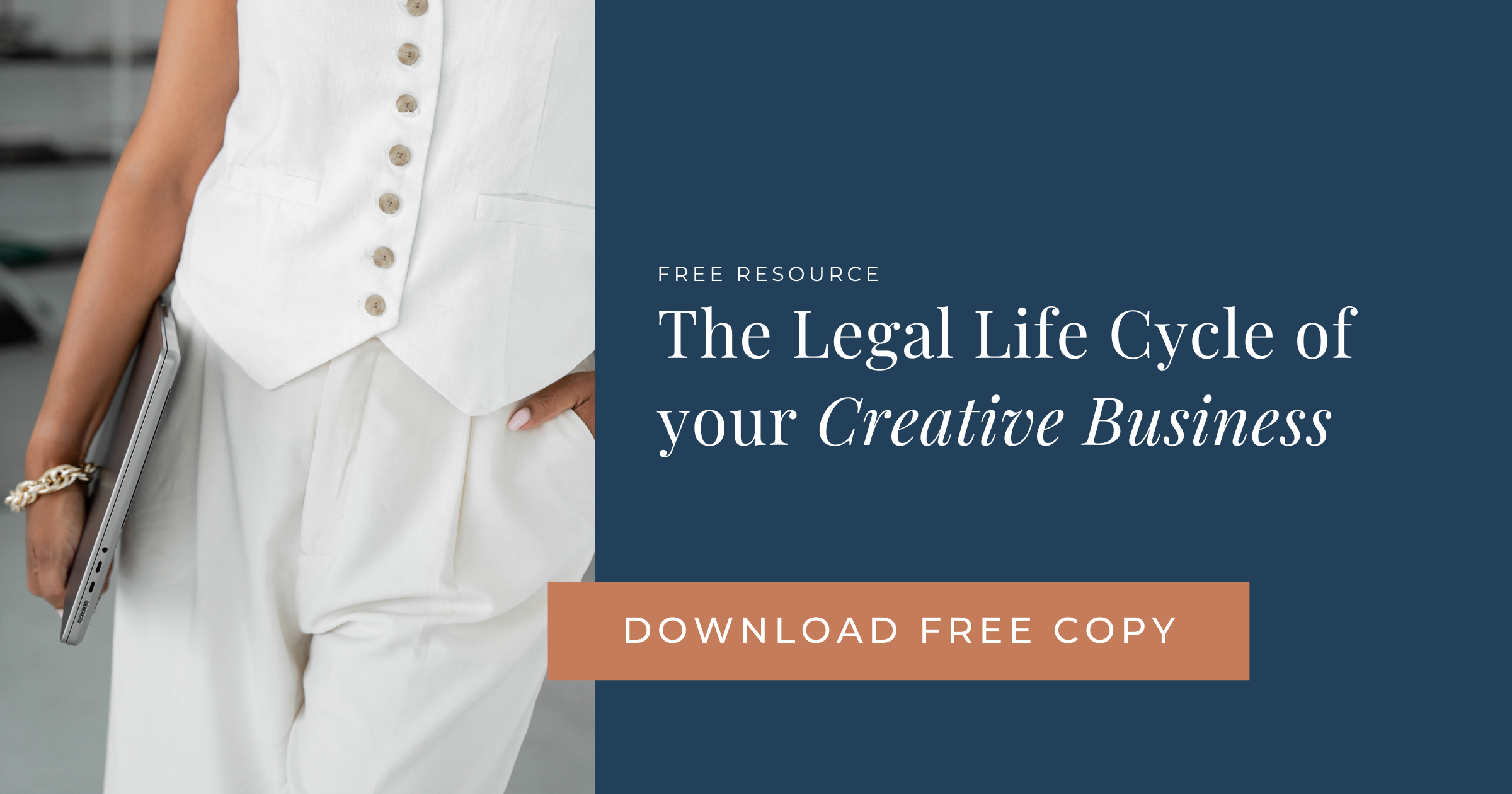The Legal Foundation Every Creative Business Needs: Phase One of The Legal Life Cycle
Smart business owners don’t wait for a problem to arise before protecting their business. They protect it from Day One.
Unfortunately, many creative business owners don’t know how to protect their business and end up learning the hard way when:
a designer gets ghosted mid-project,
a course creator faces a refund dispute,
or a photographer finds their work copied online
We want to fix that.
If you’ve ever thought, “I’ll deal with the legal stuff later,” this post is your wake-up call…
And your action plan.
What Is Phase One of the Legal Lifecycle?
Phase One is your foundation-setting phase. In a perfect world, it happens before you start your business. Before the first invoice is sent. Before the first course is launched. Before your website goes live.
But let’s be honest, running a business isn’t ‘perfect’, it’s messy. We get swept up in the momentum of a great idea, onboard our first client with a handshake, and launch a site before realizing we’ve skipped the legal prep entirely.
The good news? It’s not too late.
“If you’ve ever collected an email address, taken on a client or customer, made even one dollar from your products or services...
Then there might be legal requirements and protections you’re missing. ”
Why This Phase Matters (Even if You're Just Starting Out)
Protecting your business isn’t about being paranoid. It’s about being professional.
Phase One isn’t just about checking boxes, it’s about building confidence, clarity, and long-term security. When your foundation is legally sound, you can make decisions faster, handle hiccups with less stress, and grow your business knowing you’re covered.
This phase is all about:
Laying the groundwork for smooth operations.
Protecting and separating your personal and business assets.
Setting clear expectations with clients and customers.
Preparing your business to scale sustainably.
Let’s walk through the four essential components of Phase One.
1. Separate Your Personal and Business Assets
The very first thing every business owner should do is create legal separation between themselves and their business.
That means:
Create an LLC: A Limited Liability Company gives you legal protection so that if something goes wrong in your business, your personal assets (like your home or savings) aren’t on the line.
Open a separate bank account: Keeping business and personal finances separate isn’t just good bookkeeping—it’s essential for protecting your LLC status.
Draft an Operating Agreement: Even if you’re a solo founder, this internal document outlines how your business operates and proves that you’re taking your LLC seriously (courts and banks will expect it).
You’ve probably heard “start an LLC,” but this ^ is why it matters. And yes, it’s easier than you might think. (We walk you through it in our LLC 101 guide).
2. Choose the Right Client Agreement
A solid contract is your business’s first line of defense and a way to build trust.
When you’re offering services, selling goods, or launching a course, your contract:
Sets clear expectations.
Protects your time, income, and intellectual property.
Outlines what to do when something goes wrong.
Every business is different, so your contract shouldn’t be one-size-fits-all. We often see creatives relying on free templates or asking AI to draft something. We HIGHLY recommend using an attorney-drafted, peer-reviewed contract. Vague or overly generic contracts leave your business exposed.
Our attorney-drafted contract templates are industry-specific and clearly explain what’s included, what’s not, and what happens if (when) things go sideways.
Here’s a quick breakdown of what you might need:
Client Service Agreement – For service providers, freelancers, and creative professionals offering 1:1 services
Terms & Conditions of Sale – For digital shops or online courses
Both – If you offer services and sell products, you need both to fully cover your business
3. Protect Your Website and Online Presence
It’s probably not news to you that your website is an important part of running a business. But did you know, your website is also a legal touchpoint? And it's one of the few areas where the law says, “You must have this.”
Here’s your checklist:
Privacy Policy: Required by law (state, federal, and international law) if you collect any personal data, including through an opt-in, contact form, or tracking (think Meta Pixel or Google Analytics)
Website Terms & Conditions: These set the rules for how people interact with your site, and they’re your best defense against misuse or content theft.
Affiliate Disclaimers & Testimonial Policies: Required if you share affiliate links or client wins. You may also be required to have a professional disclaimer if you’re in a licensed field such as health, law, or finance.
Copyright Notice: A simple © [Year] [Your Business Name] can help protect your content and signal your ownership.
Getting this right builds trust with your audience and protects your online presence.
4. Understand and Secure Your Intellectual Property
Every piece of content you create is an asset. Your logo, your brand name, your course materials, your website copy… they’re all part of your intellectual property (IP).
Here’s why this matters:
IP protection gives you ownership (and you have to own your work IP to monetize it!)
It protects from others copying or claiming your content.
It ensures you don’t accidentally lose rights to something you created.
We often hear, “I’ll handle trademarks once I grow.” But waiting can backfire. We’ve seen businesses:
Forced to rebrand after someone else claimed their name.
Lose the ability to monetize courses they thought they owned.
Spend thousands in legal fees to fix what could’ve been protected from day one.
Your action steps:
Start an IP audit: List everything you’ve created and what you want to protect.
Build a relationship with an IP attorney: They can help you prioritize what to file, and when. Check out our sister company Paige Hulse Law for your IP needs.
Review your contracts: Look for IP ownership clauses, especially language such as “work-made-for-hire.” Understand who owns the work being created.
Contracts You Need in Phase One
Let’s round it out with the essential contract lineup for this phase:
Operating Agreement – Internal clarity and LLC protection
Client Agreement – The backbone of your services
Privacy Policy – Required by law if your site collects any user data
Website Terms & Conditions – Legal rules of the road for your website
Terms & Conditions of Sale – For anyone selling online products or courses
If that feels overwhelming, you’re not alone. Most of our customers come to us after a stressful situation—ghosting, chargebacks, or copycat content—and realize they need to tighten things up.
But here’s the thing: when you handle Phase One proactively, you can run your business from a place of confidence, not fear.
Ready to Protect Your Business from Day One?
The Creative Law Foundry™ exists to help you do just that, quickly and with confidence. Inside the CLF membership, our Contract Builder walks you step-by-step through creating attorney-drafted, peer-reviewed agreements tailored to your business. Every contract is backed by real-world courtroom experience, comes with lifetime updates, and includes plain-English guidance, so you can stop guessing and start protecting today.
And if you want to see where this fits into your entire business journey, grab our free Legal Lifecycle of a Creative Business ebook. It’s the complete roadmap through every phase of building a legally sound creative business. From setting your foundation in Phase One to scaling with confidence. And it pairs perfectly with The Creative Law Foundry™ so you know exactly what to protect now and what’s coming next.



